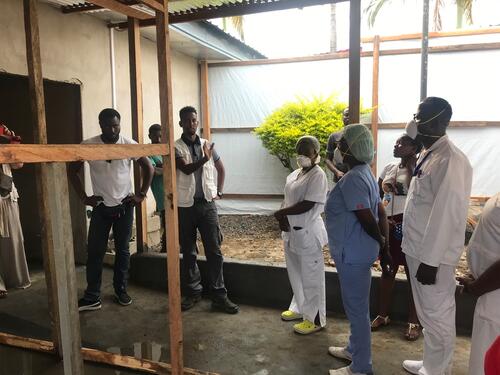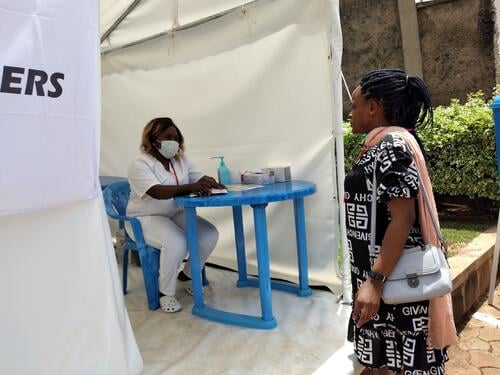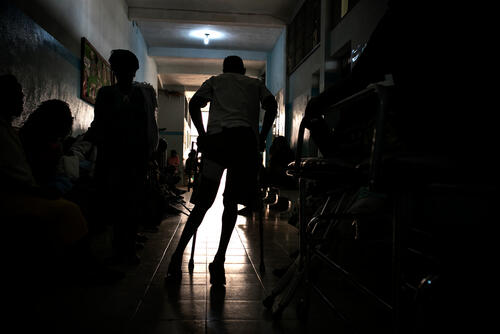- Five regions of Cameroon are affected by the COVID-19 pandemic, since a first case was confirmed on 5 March. The virus has quickly spread beyond the two main cities, making Cameroon one of the main COVID-19 hot spots in West and Central Africa.
- The outbreak poses an additional challenge for a country marked by violence in the Far North, Northwest and Southwest regions.
- While continuing our medical support in violence-ridden regions, MSF has started activities to support Cameroon’s fight against COVID-19.
In the midst of the global COVID-19 pandemic, Cameroon has emerged with one of the highest numbers of confirmed cases of the new coronavirus in sub-Saharan Africa. Since the first person was confirmed with the disease at the beginning of March, the number of infections has risen fast, reaching over 850 confirmed cases by mid-April.
The pandemic is spreading while the country is already facing major humanitarian challenges. For several years now, Cameroon has been affected by the conflict in neighbouring northeastern Nigeria, and continuous violence in Cameroon’s North West and South West regions. These crises have led to the displacement of hundreds of thousands of people, caused humanitarian needs to soar, and have drastically reduced access to healthcare in these regions, which have become particularly vulnerable.
Continuation and adaptation of our medical activities
“Continuing our medical activities in these areas already marked by massive health needs is an absolute priority for MSF,” explains Albert Viñas, Médecins Sans Frontières (MSF) emergency coordinator for Cameroon. “The current COVID-19 outbreak must not overshadow the dire humanitarian situation in the Far North, North West and South West regions. But the spread of the new coronavirus means, of course, that we had to adapt our projects, maintain essential lifesaving activities and set up new interventions.”
The current COVID-19 outbreak must not overshadow the dire humanitarian situation in the Far North, North West and South West regions.Albert Viñas, MSF emergency coordinator Cameroon
As in many other countries around the world today, MSF is supporting the national response to the COVID-19 pandemic in Cameroon. Our teams are increasing hospital capacity to manage and care for patients affected by the new virus, including reinforcing infection prevention and control measures, and setting up isolation wards.
“In Cameroon, as in most other African countries, this support is particularly crucial as the medical capacity to care for people with COVID-19 will be very limited if the country is overwhelmed with cases with severe complications, similar to what we see today in Europe or North America,” continues Viñas.
According to the World Health Organization, fewer than 5,000 beds are available for use in intensive care units in 43 African countries during COVID-19. This is about five beds per one million people, compared to 4,000 beds per one million people in Europe. Fewer than 2,000 functional ventilators are available in public health services in 41 African countries.
“We also face a risk of medical staff and frontline workers being severely affected by the pandemic,” says Viñas. “It's key to protect them and ensure safe patient flow, triage, and infection prevention and control measures in dedicated medical facilities.”

Outbreak experience in Cameroon
Since arriving in the country more than 30 years ago, MSF has fought against several infectious disease outbreaks such as HIV/AIDS, Buruli ulcer, measles and cholera. Earlier this year, we carried out a cholera intervention in Bakassi peninsula in the country’s southwest, vaccinating close to 40,000 people.
MSF was asked early on by the health authorities to support the national response to the COVID-19 pandemic, and is now implementing dedicated activities in our regular areas of intervention, as well as in Yaoundé, Cameroon’s capital.
Our activities in response to the pandemic in Cameroon so far include:
In Yaoundé
- MSF is supporting the Hôpital Général in triage, safer patient flow, and infection prevention and control measures.
- We are also increasing the capacity of the 54-bed Djongolo health facility to treat COVID-19 patients. We have started the construction of four rooms with 20 beds each, in order to increase the capacity to 134 beds.
In North West and South West regions
- MSF is supporting the regional hospitals of Bamenda and Buea in the management of COVID-19 patients. We have installed pre-screening spots at the entrance of these facilities, supported the setting up of COVID-19-specific isolation and treatment wards (with capacity for 16 and 20 beds, respectively) for suspected and confirmed patients, and have trained medical and non-medical staff who will run the units.
- MSF has also strengthened measures to prevent the spread of the new coronavirus in the health facilities we support in Bamenda, Kumba, Muyuka, Mamfe and Widikum.
- The procedures for our ambulance service have been adapted. Call centre operators have been trained to recognise suspected cases, liaise with authorities, and act accordingly. Ambulance nurses and drivers have received special training and equipment, and dedicated vehicles have been selected for the transportation of people suspected of having COVID-19.
To improve prevention - especially among people affected and displaced by violence - community health workers and nurses have been trained to deliver specific messages linked to COVID-19, and to identify people suspected of being sick with COVID-19 that can be referred. Radio spots have been produced to support infection prevention efforts at community level.
In the Far North
- Patient flow and infection prevention and control measures have been adapted in both the regional hospital of Maroua and in the Mora hospital, where we have been present since 2015.
“In addition to all these activities, potential technical support is also under assessment for hospitals in Douala, Cameroon’s commercial hub and the second-most affected city,” says Viñas. “All these activities require extra means, teams and materials in a situation where global movements of people and goods are very, very difficult. But our teams are working around the clock to maintain our regular, lifesaving activities while responding to this new outbreak.”






